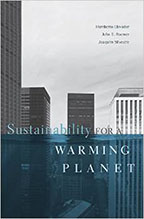
Human-generated greenhouse gas emissions imperil a global resource: a biosphere capable of supporting life as we know it. What is the fair way to share this scarce resource across present and future generations, and across regions of the world? This study offers a new perspective based on the guiding ethics of sustainability and egalitarianism.
- The authors provide a normative approach to global warming that they call sustainability. It consists in finding an economic path that, while satisfying environmental and other constraints, would maintain human welfare for all future generations. They also explain why the current discounted utilitarian approach is unsatisfactory. The book has many original arguments expressed in a clear, logical structure. It should be required reading for graduate students in public economics. (Phillipe De Donder, Toulouse School of Economics)
- This book should be of great interest to economists working in the field of climate change, particularly those who would like to explore alternatives to the dominant paradigm of discounted utilitarianism. Rejecting that paradigm, the authors evaluate climate policy using sustainability criteria, requiring either that future generations have the same level of utility as earlier generations or that utility grows by at least a fixed rate. (Larry S. Karp, University of California, Berkeley)
- Humberto Llavador is Associate Professor of Economics at Pompeu Fabra University.
- John E. Roemer is Elizabeth S. and A. Varick Stout Professor of Political Science and Economics at Yale University.
- Joaquim Silvestre is Professor of Economics at the University of California, Davis.